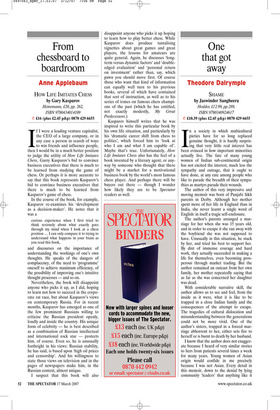From chessboard to boardroom
Anne Applebaum
HOW LIFE IMITATES CHESS by Gary Kasparov Heinemann, £20, pp. 262, ISBN 9780434014109 ✆ £16 (plus £2.45 p&p) 0870 429 6655 If I were a leading venture capitalist, the CEO of a large company, or in any case a person in search of ways to win friends and influence people, then I would be in a much better position to judge the utility of How Life Imitates Chess, Garry Kasparov’s bid to convince business executives that there is much to be learned from studying the game of chess. Or perhaps it is more accurate to say that this book represents Kasparov’s bid to convince business executives that there is much to be learned from Kasparov’s game of chess.
In the course of the book, for example, Kasparov re-examines his ‘development as a decision-maker’. He notes that it was a
curious experience when I first tried to think seriously about what exactly goes through my mind when I look at a chess position ... I can only compare it to trying to understand what happens in your brain as you read this book,
and discourses on the importance of understanding the workings of one’s own thoughts. He speaks of the dangers of complacency, of the need to ‘programme’ oneself to achieve maximum efficiency, of the possibility of improving one’s intuitive thought processes — and so on.
Nevertheless, the book will disappoint anyone who picks it up, as I did, hoping to learn not how to succeed in the corporate rat race, but about Kasparov’s views on contemporary Russia. For in recent months, Kasparov has emerged as one of the few prominent Russians willing to criticise the Russian president openly, loudly and inside the country. His unique form of celebrity — he is best described as a combination of Russian intellectual and international rock star — protects him, of course. Even so, he is unusually forthright in his views: Russian stability, he has said, is based upon ‘high oil prices and censorship’. And his willingness to state those views on television and in the pages of newspapers make him, in the Russian context, almost unique.
I suspect that this book will also disappoint anyone who picks it up hoping to learn how to play better chess. While Kasparov does produce tantalising vignettes about great games and great players, the lessons for amateurs are quite general. Again, he discusses ‘longterm versus dynamic factors’ and ‘doubleedged evaluation’ and ‘personal return on investment’ rather than, say, which pawn you should move first. Of course those who want that kind of information can equally well turn to his previous books, several of which have contained that sort of instruction, as well as to his series of tomes on famous chess champions of the past (which he has entitled, not exactly modestly, My Great Predecessors.) Kasparov himself writes that he was inspired to write this particular book by his own life situation, and particularly by his ‘dramatic career shift from chess to politics’, which forced him to ‘look at who I am and what I am capable of’. Maybe that’s true. Unfortunately, How Life Imitates Chess also has the feel of a book invented by a literary agent, or anyway by someone who thought that there might be a market for a motivational business book by the world’s most famous chess player. And perhaps there will be buyers out there — though I wonder how likely they are to be Spectator readers as well.


































































































 Previous page
Previous page